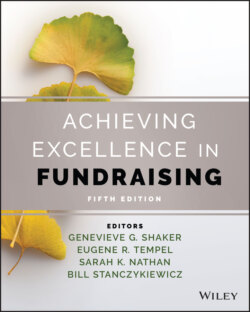Читать книгу Achieving Excellence in Fundraising - Группа авторов - Страница 113
The Joy of Giving during Difficult Times
ОглавлениеGiving time and money can promote increased happiness and health even during difficult times. For example, aging adults often face increased difficulty completing tasks like lifting heavy objects or climbing stairs. Research finds that people who have more altruistic attitudes are better able to cope emotionally with such losses of independence. Indeed, those who choose to volunteer despite these limitations live longer than those who do not.
The joy of giving has been found in other groups facing challenges, including those receiving welfare benefits, individuals with disabilities, those with traumatic brain injuries, individuals with lumbar spine disorders, spinal cord injuries, multiple sclerosis, HIV/AIDS, and older adults with dementia, other forms of cognitive impairment, or living in long‐term care facilities.
Among those with ongoing psychological problems, like post‐traumatic stress disorder or social anxiety, giving can help to manage their symptoms. In fact, research finds that more depressed young people experience more joy of giving than less depressed ones. And among teens who experience adverse childhood experiences, volunteering can help to buffer them from poor mental health. Even individuals who have had trouble with the law experience the joy of giving, which is a hopeful finding suggesting potential motivations and pathways for rehabilitation.
People often increase charitable giving in response to disasters and pandemics, and research finds that such increases in charitable donation are associated with increases in happiness – despite the stress and trauma of the situation itself. In the face of tragedy, giving time and money is not only good for the recipients, but for the givers themselves.
The COVID‐19 pandemic created a uniquely challenging situation in that many givers found it more difficult to give, whether because of financial constraints or being homebound. Even in this time, givers experienced more positive emotions overall. However, givers who also perceived high risk to themselves or their loved ones actually experienced more negative emotions than less generous people. More research will help to uncover the complex implications of giving during the pandemic.
